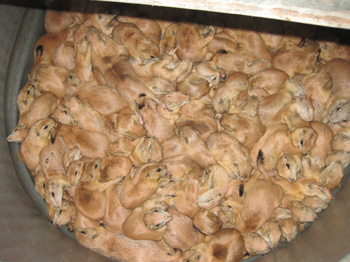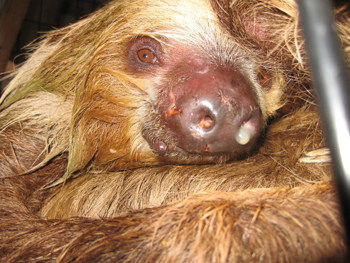
In the biggest such raid in U.S. history, on December 15, 2009, Arlington, Texas officials and humane agents removed more than 26,000 animals, including kinkajous, wallabies, sloths, ringtail lemurs, coatimundis, agoutis, hedgehogs, chinchillas, hamsters, gerbils, rats, mice, flying squirrels, guinea pigs, sugar gliders, prairie dogs, ferrets, snakes, lizards, turtles, frogs, spiders, crabs, and scorpions from a warehouse owned by U.S. Global Exotics, Inc. (USGE), a major player in the pet trade. USGE had for years imported and exported millions of "exotic pets" for eventual sale at major pet stores and pet store chains all over the world, including at PETCO and PetSmart stores. What was found inside the warehouse shows that the cost, to the kinkajou and the other animals shunted from pillar to post in the pet trade, was extremely high.
The seizure came about because a PETA undercover investigator spent seven months working inside the warehouse, carefully recording evidence of horrifically cruel conditions for animals. It took that long because PETA did not want the defense to say what was witnessed was an exception. We wanted to show it is the rule. Thousands of reptiles, amphibians, small mammals, arachnids, and many other animals--including sloths, wallabies, and ring-tailed lemurs--were crammed into cattle-feeding troughs, cardboard boxes, bags, and even soda bottles. They were denied even modest amounts of food, water, medical treatment for injuries and illness, and other basic care. Many animals were starved and dehydrated, had wounds that were so deep that muscle and bone were exposed, and were thrown away while still alive or intentionally frozen to death in the facility's freezers.

Defense lawyers tried every trick in the book to get the animals back, but failed. The most telling lesson for the consumer was the plea that these appalling conditions are the industry norm! In other words, buy an "exotic" animal at Petsmart and add to the cost at the cash register, the cost in lives of the inevitable casualties that went into putting that animal in your hands. You will never know, but the evidence in this case let's you guess, how many other snakes or lizards or hedgehogs died when removed from their natural homes, in transit, and in someone's warehouse.
PETA's investigation saved far more than 26,000 animals--our efforts spared tens of thousands of animals the misery of being captured and taken from their native homes; shipped in cramped crates, pillowcases, and containers; and kept in deplorable, hellish conditions at USGE's nasty warehouse. One thing it didn't do is stop people from being unwitting players in all this. So, if you are tempted to bring an animal into your home, please go to the pound or shelter instead of the pet shop. Take home someone who is suited to our climate, confinement in a house, can be walked outdoors or played with inside, and is going to appreciate your love and give love back in return, i.e. a dog or cat.

Until the PETCOs and PetSmarts of the world stop selling animals--all of whom I'd bet come from hellholes like USGE, where profit is the only thing that counts and the welfare of animals mean nothing-- PETA will be pushing consumers to wake up and smell the iguana. Please don't shop at PETCO or PetSmart, and tell your friends not to shop there either and never to support any pet store that sells live animals--always adopt from animal shelters and rescue groups. Somewhere in a forest or stream far away, animals will be safer for your decision.
